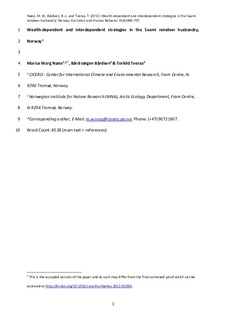| dc.contributor.author | Næss, Marius Warg | |
| dc.contributor.author | Bårdsen, Bård-Jørgen | |
| dc.contributor.author | Tveraa, Torkild | |
| dc.date.accessioned | 2017-11-09T16:37:35Z | |
| dc.date.available | 2017-11-09T16:37:35Z | |
| dc.date.created | 2013-01-24T09:39:48Z | |
| dc.date.issued | 2012 | |
| dc.identifier.citation | Evolution and human behavior. 2012, 33 (6), 696-707. | |
| dc.identifier.issn | 1090-5138 | |
| dc.identifier.uri | http://hdl.handle.net/11250/2465392 | |
| dc.description.abstract | It has been argued that decisions in relation to choosing strategies to a large degree depend on an organism's state. For nomadic pastoralists, wealth is an important state variable since it has been argued that differences in observed behaviours reflect alternative strategies dependent on varying socioeconomic circumstances. From a game theoretical point of view, however, strategies are also interdependent, i.e., the choice of a strategy cannot be made wisely without considering what other actors are doing since the outcome of a given strategy is dependent not only on individual state but also on the strategies of others. This study investigated to what degree slaughter strategies in the Saami reindeer husbandry are both state dependent and interdependent. The main findings in this study were that (a) the probability, (b) the amount, and (c) the type of animal slaughtered to a large degree were influenced by both individual herders’ herd size and the number of animals slaughtered by neighbouring herders. Moreover, this study also found that kinship represents a coordinating principle since the degree of genealogical relatedness had a positive effect on the slaughtering strategies adopted by herders. | |
| dc.language.iso | eng | |
| dc.title | Wealth-dependent and interdependent strategies in the Saami reindeer husbandry, Norway | |
| dc.type | Peer reviewed | |
| dc.type | Journal article | |
| dc.description.version | submittedVersion | |
| dc.subject.nsi | VDP::Sosialantropologi: 250 | |
| dc.subject.nsi | VDP::Social anthropology: 250 | |
| dc.source.pagenumber | 696-707 | |
| dc.source.volume | 33 | |
| dc.source.journal | Evolution and human behavior | |
| dc.source.issue | 6 | |
| dc.identifier.doi | 10.1016/j.evolhumbehav.2012.05.004 | |
| dc.identifier.cristin | 996429 | |
| dc.relation.project | Norges forskningsråd: 204174 | |
| cristin.unitcode | 7475,0,0,0 | |
| cristin.unitname | CICERO Senter for klimaforskning | |
| cristin.ispublished | true | |
| cristin.fulltext | preprint | |
| cristin.qualitycode | 2 | |
